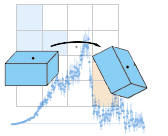
| HOME | PEOPLE | RESEARCH | ACADEMICS | TRAVEL/VISITORS | LINKS | CONTACT |

|
Web Mail
Mailing Lists
Computing Resources
Site Map
CIMMS Lunchtime Series: Informal Lectures on Equation-Free Modeling
Yannis Kevrekidis, Department of Chemical Engineering, Princeton University
Wednesday, October 12, 200512:00 PM to 1:30 PM
Steele 114 (CDS Library)
The aim of this sequence of informal talks is to (a) present the main simple ideas underpinning equation-free modeling, and the way these ideas link with traditional continuum numerical analysis schemes; (b) present a sampling of applications that illustrates the scope and applicability of the approach to current modeling problems and (c) discuss recent developments (such as equation-free views of uncertainty quantification, and the selection of good observables using harmonic analysis on data-based graphs), limitations of the approach, and links to different multiscale approaches.
The plan is to organize the three lectures around the three topics in the order above, but I would like them to be a informal (and useful) guided tour, and the audience can guide the discussion.
Items that I plan to discuss in the first lecture are the "legacy code" view of equation-free computing ; coarse projective integration; coarse-grained bifurcation computations and the link to matrix-free iterative linear algebra methods; patch dynamics and gaptooth schemes for spatially distributed problems, and their numerical analysis via timestepping; boundary conditions for such schemes; and twists for problems with symmetry, including self-similar problems.
The list of examples that can be visited in the second lecture includes Lattice-Boltzmann simulations for reaction-diffusion and multiphase flow problems; SSA simulations of surface catalytic reactions and gene regulatory networks; Brownian Dynamics simulations of nematic liquid crystals; Monte Carlo simulations of micelle assembly; molecular dynamics simulations of alanine dipeptide folding and of water interacting with carbon nanotubes; "homogenization" (effective medium) problems for reaction and transport in heterogeneous media; and other "inner solver" examples (phase oscillators, model neurons, agent-based models, moving cells, stars).
In the third lecture, and depending on the first two ones, I would like to discuss "current issues" - avenues of research that appear promising (such as equation-free uncertainty quantification), relations to other approaches, connections that we know about but have not had time or knowledge enough to pursue. In particular, I want to discuss the "variable free" part of equation-free computing: how to select, from data analysis, good variables with which to perform equation-free computations - linking data analysis and modeling, hopefully in a seamless fashion.
Since the main point of equation-free computation is to use the "fine scale model" as an experiment that can be initialized at will, I hope to bring out during these talks links to traditional system and control theory tools -- tools that have been developed as a way to interact with physical experiments, and which we are now using to interact with computational experiments. In this spirit, I will probably end up with some wild speculations about equation-free experimentation.
|
©2003-2011 California Institute of Technology. All Rights Reserved webmaster |
|